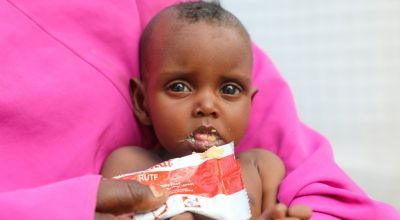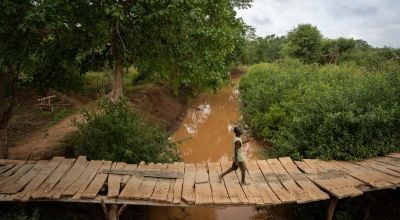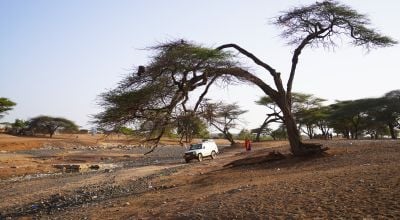
Read our 2023 annual report

Knowledge Hub
Communities across Somaliland and Somalia are preparing for a severe drought in the coming months and while drought is a recurring feature of life in the Horn of Africa, this one is different.
Our Media Relations Manager Eamon Timmins recently travelled to the region to see what the reality is like on the ground for those at the coalface of climate change.
Somalis are facing their second drought in three years, making it difficult to predict the scale of the impact it will have on vulnerable communities.
In the barren village of Jir Jir in Somaliland, Rosa Osman faces an uncertain future. The mother-of-13 once had a herd of goats and grew her own crops, which allowed her and her family to live comfortably.
However, changing weather conditions have had a devastating impact on her livelihood.
As she sits under in a tree to shelter from the searing heat, Roda explains that the rains which usually begin in March did not arrive until May. It was a case of too little too late for Roda. The late rains meant her sorghum seeds did not germinate in time and the plants will not mature before the rainy season ends.
“The crop will fail,” she said. “We will get fodder for the animals, but no crops.”
It is the latest in a series of cruel blows for the proud mother, whose children range from one to 18 years old. Prior to the drought of 2017, Roda had 25 goats but today she has just ten left, in addition to a camel and a calf.
With her crops failing and her livestock depleted, she is now dependent on the payment of €53 a month that she is receiving from the Somali Cash Consortium, a group of NGOs led by Concern.
“If the droughts continue, we may lose the remaining livestock. The amount of cash we receive may not be enough for us to survive.”
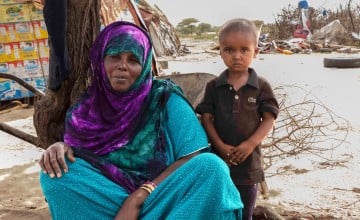
Our Country Director for Somalia/Somaliland Abdi-Rashid Haji Nur has witnessed a number of previous droughts and the tragic toll they have taken.
The 1991/92 drought, combined with the civil war at the time, resulted in the deaths of more than 250,000 people. This was followed by further difficulties in 2011, when regional insecurity prevented humanitarian organisations from reaching many of those who were in dire circumstances.
While conflict and insecurity have been major factors in exacerbating the impact of drought, climate change is now playing a major role. Historically, communities would have a number of years to recover from drought but changes to the weather cycle is now seeing the same families being hit year-on-year.
“The frequency of the droughts and the unpredictability of the rains is increasing. If you have one bad rainy season, with the support from agencies, you might be able to sustain things but when the rains fail for a second time it forces people to leave their homes in search of water. It destroys agricultural land,” said Abdi-Rashid.
Jama Igeh Farah, chairman of Jir Jir’s Volunteer Relief Committee, explains that over 1,900 people live in the village and rely on crops including maize, sorghum and beans for food.
The infrequent and unpredictable rains have left the community extremely vulnerable and reliant on aid to get through the barren periods.
“We have been in the rainy season for the last four months, but we have only had two rainy days. The sorghum should be one metre tall and ready for harvest now, but it is just three inches high. The crop cannot be saved – it has been in the land for too long. We are worried. We are just waiting on God for rain.”

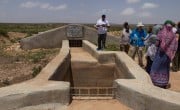
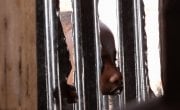
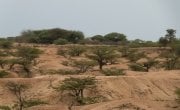
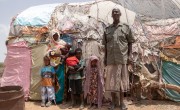
Rivers run dry
A few miles away, those living in the village of Carracad tell the same story. The wide river bed is like a beach.
Normally, the river flows during the wet season. Now, towards the end of this season, a small puddle that goats gather around is the only clue that a river was here.
This local well is the main source of water for the 2,100 people in the local village and their livestock.
This drought is the latest in a series of crushing blows felt by the community. As a result of the drought in 2017, 80% of the local livestock (including cattle, donkeys, goats and camels) died and have not been replaced.
Cyclone Sagar also roared through the village in 2018, causing immeasurable damage to land and houses.
“The impact of the drought and cyclone means we do not have enough milk and the remaining livestock are not good enough to be sold,” said Osman Alele, chairman of the Village Relief Committee.
In Borama, the nearest town, a Save the Children nutrition clinic is working with people who have been forced to move to temporary camps in the town. The clinic treated 329 moderately or severely malnourished children during the first five months of this year. Diarrhoea is the main driver of malnutrition, due to poor hygiene in the camps and inadequate supplies of clean water.
While lengthy dry seasons and lacklustre rains are becoming common in the region, there is much that can be done to mitigate against the impact of extreme weather events.
The response of the international community to the drought of 2017 is viewed as a good example of the impact that humanitarian aid can have in preventing drought becoming a famine. Early intervention from donors enables aid agencies to respond in a coordinated way for a truly effective response.
Building for the future
The Somali Cash Consortium distributed over €16m in payments to over 300,000 people last year. These payments are made by electronic transfer, using SIM cards and mobile phones and the operation is primarily funded by the EU’s ECHO programme, with some funding also provided by Irish Aid.
The bulk of the money dispersed is used for food, with some households also using it for other essentials such as purchasing water, medicine, fuel and education. Providing cash directly to the families empowers them to choose the items that will make the biggest difference to their situation.
We are also working with communities to build their capacity to deal with climate change. For example, near the village of Shirwac, we developed an underground water tank that can hold up to 310,000 litres of rain water for when the flash floods come.
With funding from Irish Aid, our agricultural experts are working with local farmers to diversify the crops they grow and introduce quicker maturing and drought-resistant plants. This involves training farmers to use ‘climate smart’ conservation agriculture techniques to maximise the rain that does fall, irrigate the land and protect the soil.
In some cases, families can be left with no choice but to move to urban areas as a result. To respond to this, we are targeting women and teenagers to train and assist them in establishing businesses that will provide them with an income.
The skills being shared with these farming communities, women and teenagers will be vital in the difficult months and years to come.
Help people living in extreme poverty all over the world



